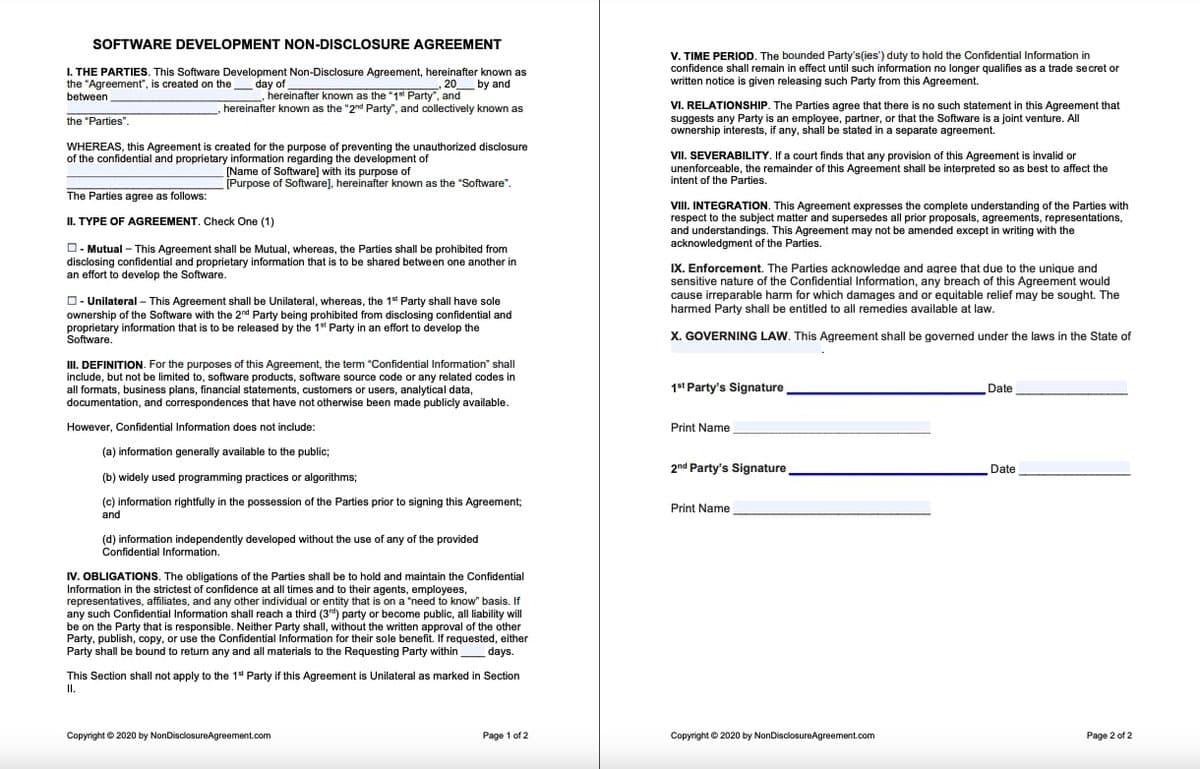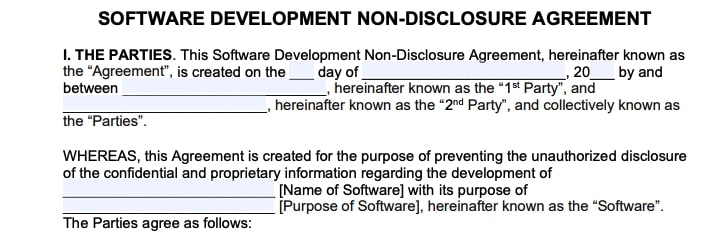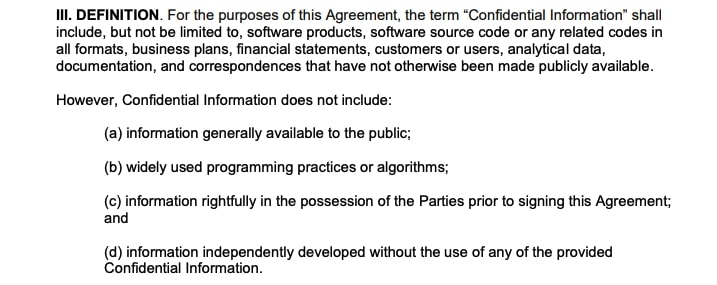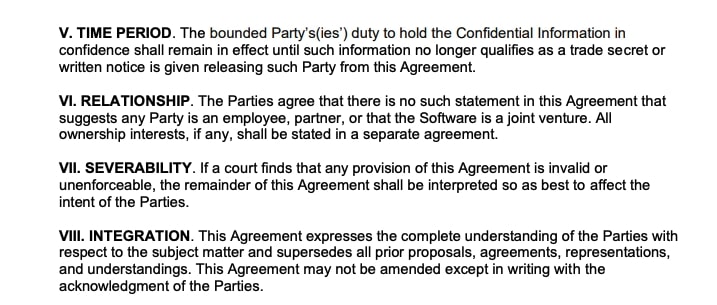

In the dynamic and highly competitive field of software development, safeguarding your intellectual property and confidential information is essential. Whether collaborating with freelancers, outsourcing to development agencies, or engaging with partners, a non-disclosure agreement (NDA) is an indispensable legal safeguard.
An NDA is a contract between businesses, outsourcing firms, or software developers. It ensures that highly sensitive information shared during the software development process remains protected and is not disclosed to anyone not directly involved in the process.
This article will guide you through the critical aspects of NDAs in the software development industry. We’ll discuss the types of NDAs, their key components, who you should sign them with, and more, ensuring you can protect your valuable information effectively.

An NDA is a legally binding contract that fosters a confidential relationship between two or more parties. Its primary objective is to prevent the unauthorized disclosure of sensitive information shared during a business relationship. In the realm of software development, this typically encompasses proprietary code, strategic business plans, client data, and other forms of intellectual property. Revealing this information without permission could hurt the company’s reputation and lead to significant financial losses.
NDAs are usually signed before a company (the client) starts working with an outsourcing firm or software developer (the service provider). The NDA defines confidential information and requires both parties to keep it secret during and after the project. A well-crafted NDA limits the use of ideas and information to a defined purpose, like software development. If the information is disclosed or used for other purposes, you can pursue legal action or request compensation.
Thus, partnering with a reliable expert to draft your NDA is crucial to ensure it meets the business requirements. DevsData LLC brings over 8 years of expertise in the market and extensive experience working with international corporate clients and rapidly growing American and Israeli startups. They can assist in creating a customized NDA that aligns with your business needs and protects your confidential information.
NDAs come in various forms, each tailored to different situations and needs. Understanding these types can help you select the most appropriate agreement for your circumstances. Here are the primary categories of NDAs:
A unilateral NDA, also known as a one-way NDA, is used when only one party discloses confidential information. This type of agreement ensures that the recipient of the information is legally obligated to keep it confidential. It’s commonly used when a company shares sensitive information with a potential business partner, contractor, or employee but does not receive confidential information in return.
A mutual NDA, or bilateral NDA, is used when both parties share confidential information. This type of agreement ensures that each party must protect the other party’s information. Mutual NDAs are often used in collaborative projects, joint ventures, or partnerships where both sides need to exchange sensitive information.
A multilateral NDA involves three or more parties, with at least one party sharing confidential information with the others. This type of agreement is useful in scenarios involving complex collaborations or business arrangements where multiple entities need to share sensitive information while maintaining confidentiality.
An NDA can be tailored or created in various ways, but every agreement requires specific essential components. The following sections will outline the critical clauses and provisions commonly found in standard NDAs. You can also take a look at the template here.
The parties involved in an NDA can vary depending on whether the agreement is unilateral or mutual. In a unilateral NDA, there is a Disclosing Party (the one sharing confidential information) and a Recipient (the one receiving it). In a mutual NDA, both parties exchange confidential information and agree to protect each other’s data.

When entering into an NDA for a software development project, it’s crucial to ensure that you sign the NDA with the right individuals or entities. Since various parties will likely be involved and exposed to sensitive information, everyone must be on the same page regarding confidentiality. This includes:
Investors and stakeholders may not always sign NDAs, but they must still be mindful of confidentiality concerns related to sensitive project details. Additionally, if the Recipient needs to share confidential information with their associated firms, partners, or agents, the NDA should also extend the coverage to these entities. The agreement should also obligate the Recipient to ensure that their employees and any third parties involved in the project maintain the confidentiality of the information. It’s also essential to have internal staff sign the NDA to cover all potential access points to the sensitive information.
An NDA should clearly define what constitutes “confidential” information. In the context of software development, this typically includes:

The duration of an NDA is specified within the agreement and varies depending on the project and information sensitivity. The NDA outlines the period during which the confidentiality obligations apply, including both the active term of the agreement and any post-term obligations. This section also outlines the extent of confidentiality obligations, typically encompassing two main types of obligations for the Recipient:
The Recipient must take reasonable measures to protect the confidentiality of the information shared. This includes safeguarding the information from unauthorized access, disclosure, or misuse. The NDA should specify the standard of care required, such as using secure storage methods and restricted access to the information.
The Recipient is restricted from using the confidential information for any purpose other than the one specified in the NDA. This means that the information can be exclusively used for the agreed-upon project or business relationship and cannot be shared with third parties or applied to other projects. The NDA should also detail any conditions under which disclosure is allowed, such as employees or contractors needing the information to perform their duties, provided they are bound by similar confidentiality obligations.

The NDA should clearly outline what each party needs to do to keep confidential information safe:
Both parties must take reasonable steps to secure the information from unauthorized access or disclosure. This means using appropriate security measures, like encryption or secure storage, to keep the information safe.
Neither party can share confidential information with anyone outside the agreed scope without explicit permission. This ensures the information stays within the intended circle and is not leaked or misused.
Both parties must return or destroy all confidential materials when the project ends, or the NDA is terminated. This helps ensure that no sensitive information remains in possession after the collaboration has ended.

To ensure a robust NDA for software development, it’s crucial to outline the consequences of a breach. Unauthorized disclosure or misuse of confidential information can lead to significant legal and financial losses, including legal liability, damage to professional reputation, and potential court orders to stop business operations.
Typically, if a breach occurs, the Disclosing Party may seek financial compensation. This is often a fixed amount specified in the NDA. Additionally, the NDA might include provisions for recovering attorneys’ fees and court costs from the breaching party if the case is won. Setting reasonable penalties is important to avoid discouraging potential partners or signing agreements with unqualified or desperate vendors.
Including ADR methods in an NDA can provide a more private and efficient way to resolve conflicts outside the courtroom. ADR offers several advantages over traditional litigation. Standard ADR methods include:
ADR can be more effective and confidential compared to public litigation. It’s essential to confirm that the NDA specifies that any ADR procedures will occur in your jurisdiction and that any involved third parties are also bound by the confidentiality terms. This ensures that any dispute resolution process remains secure and within the agreed terms of the NDA.
To finalize an NDA, it’s important to specify the governing law and jurisdiction that will apply in the event of a dispute. Ideally, the chosen court should be located in your area for convenience, though you may also opt for a neutral location if preferred.
If the NDA includes ADR as a method for resolving conflicts, it’s beneficial to clearly outline the ADR procedures and designate where these proceedings will occur. This ensures that all parties know how disputes will be managed and where they will be resolved.

As discussed, when engaging in software development projects, signing an NDA is essential for safeguarding your proprietary information and ensuring the success of your collaboration. Here’s why you should consider an NDA:
Sharing proprietary code, algorithms, and innovative ideas requires a legal framework to protect them. An NDA ensures that these critical elements remain confidential and are not used or disclosed without authorization.
An NDA defines what information is confidential and how it should be handled, providing clear guidelines for all parties involved. This prevents misunderstandings and ensures that everyone understands their confidentiality obligations.
With an NDA, you can share sensitive details with your development partners more freely. This open exchange of information can lead to more effective collaboration and better project outcomes while protecting your intellectual property.
An NDA restricts the use of your confidential information to the specific purposes of the software development project. It prevents the other party from using your data for unauthorized activities, protecting your competitive advantage.
An NDA provides a legal framework for seeking solutions in case of a breach. It outlines the consequences of unauthorized disclosure and gives you the right to pursue legal action for damages or injunctions.
However, it’s important to note that signing an NDA is not always necessary. For example, if you hire a software development company to create a publicly available website, requiring an NDA before the project begins may be impractical and could slow down the process. Similarly, an NDA might not be needed if your project does not involve sharing confidential information. In such cases, a simple non-disclosure clause within the Service Agreement and other relevant provisions may be sufficient to protect your interests.
Protecting your intellectual property and confidential information is crucial in software development. A well-defined NDA is your best defense against unauthorized access and misuse of sensitive data. You can safeguard your project’s integrity by incorporating clear confidentiality obligations, detailing the repercussions of breaches, and specifying alternative dispute resolution methods.
DevsData LLC, with over 8 years of industry expertise, is a leading IT recruitment and software development agency capable of providing comprehensive NDA solutions. Holding a government-approved recruitment license, the company has successfully partnered with over 83 clients and completed more than 100 projects. Operating globally with regional offices across Europe, Asia, North America, Latin America, and Australia, DevsData LLC is well-equipped to assist businesses in managing their confidentiality needs across various markets.
In addition, DevsData LLC offers extensive employer of record (EoR) and business process outsourcing (BPO) services. Their strategic EoR solutions cater to specialized recruitment needs, delivering a customized approach to talent acquisition. Their diverse BPO offerings enhance operational efficiency, enabling organizations to focus on their core functions while achieving their business objectives.
Reach out to DevsData LLC at general@devsdata.com or visit their website at www.devsdata.com.
Address:
DevsData IT Recruitment Agency Poland
Jerozolimskie 181B, 5th floor,
02-222 Warsaw, Poland
poland@devsdata.com
Frequently asked questions (FAQ)
DevsData – your premium technology partner
DevsData is a boutique tech recruitment and software agency. Develop your software project with veteran engineers or scale up an in-house tech team of developers with relevant industry experience.
Free consultation with a software expert
🎧 Schedule a meeting
FEATURED IN


DevsData LLC is truly exceptional – their backend developers are some of the best I’ve ever worked with.”
Nicholas Johnson
Mentor at YC, serial entrepreneur






Categories: Big data, data analytics | Software and technology | IT recruitment blog | IT in Poland | Content hub (blog)
